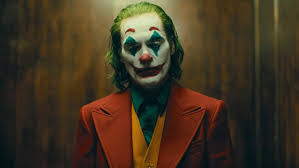 |
| Despite Joaquin Phoenix's efforts, Kino Biff is nonplussed by Joker |
In general, I see nothing wrong with using a comic book character's back story to criticize Trump and our selfish elites. However, in order to do so, Joker contorts itself like a pretzel to make the title character sympathetic. Mental illness is raised as an issue, kind of, but Phillips drops it like a hot potato as soon as Joker slaps on his makeup and starts dealing death to the wicked 1%. Since two of the people killed by the proletariat mob he incites are Bruce Wayne's parents, the blueprint of future sequels is set. Phillips provides an iconic moment for Phoenix by having him dance on a staircase to Gary Glitter, but for most of Joker, Phillips is content to shoot fish in a barrel. The white whale of Trump is a tempting target, but, in Joker, Phillips does little more than express Hollywood's revulsion towards him.





No comments:
Post a Comment